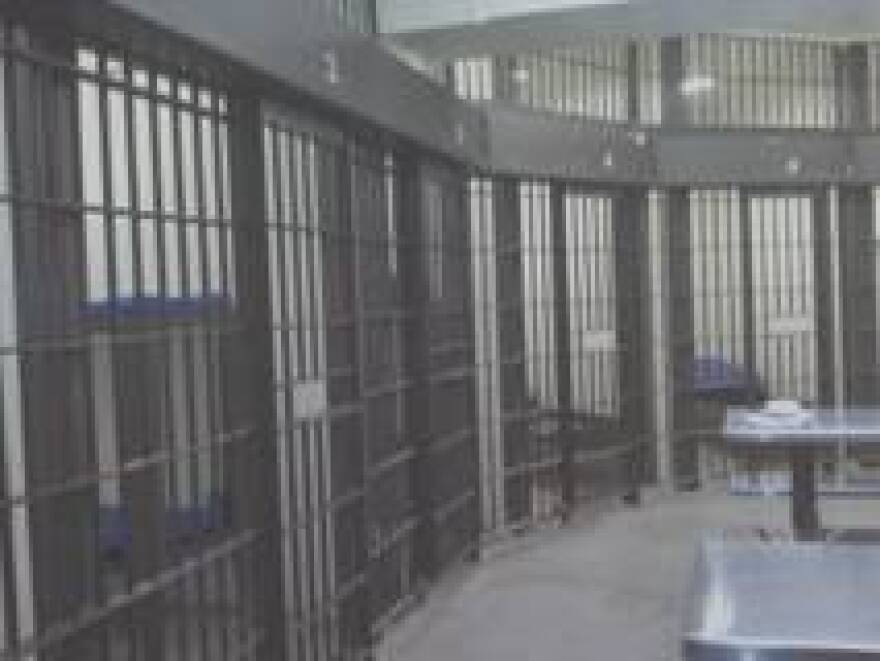Crowded jails are still a problem for a number of county lock-ups in northern Illinois. Some have expanded their facilities to get a handle on inmate populations. Others have to rely on jails in neighboring counties for extra space. But the practice of shifting overflow inmates presents challenges.
It’s a typical morning at the DeKalb County jail. Staff members are preparing inmates to appear in court via video conference. However, a handful of them appearing today did not start their day at this facility.
They're currently being housed at the Kendall County jail. It’s one of two facilities DeKalb County uses on a regular basis to help deal with overcrowding. They also house inmates temporarily at the Boone County jail. DeKalb County Sheriff Roger Scott says they’ve been doing this for a little more than a decade now.
“I started it with maybe 7 or 8 inmates a day. Now we’ve progressed to 2013 and we’re housing somewhere up to 40 to 50 inmates from our jail at other facilities every day,” Scott said.
DeKalb County’s jail capacity is 89 beds. But, with more and more inmates dealing with things like mental health issues, officials say the bed availability is actually lower.
Scott says it costs the county about a million dollars a year to shuffle overflow inmates back and forth from other counties. He says, if they were able to keep all of them under one roof, it probably would cost about the same. But he estimates those costs would go down over the course of time, while adding that the money would be spent within the county.
Scott says their concern doesn’t just center on dollars and cents. Transferring inmates involves taking deputies away from their regular duties at the jail. And, he says, doing it every day pushes the public safety envelope.
“The more you move inmates from one location -- especially the distances we travel -- to another, obviously there are security issues that come along with that. The more chances you have for trouble,” Scott said.
For several years, DeKalb County has been making plans for a larger jail, but the funding is tied to a controversial project involving a landfill expansion. Until the funding is ultimately in place and the new facility is built, the sheriff’s department will have to keep looking elsewhere for extra beds.
Kendall County Sheriff Richard Randall says, thanks to a pair of jail expansions over the past couple of decades, they’ve been able offer space to other counties in need, including DeKalb. He says the extra revenue has allowed them to pay back the cost of construction.
He also says it gives them an opportunity to make full use of the facility, which was constructed to accommodate massive growth in the region.
“When the population grows, the percentage of people making bad decisions and suffering the consequences of incarceration is going to happen,” Randall says.
Randall doesn’t seem to worry about losing this revenue if bigger jails are built elsewhere. He says they could use the extra space to house the homeless. He also says, with his department dealing with more electronic crimes these days, there’s still a great need to ensure there are enough beds. And the Illinois Sheriff’s Association says more pressure will be placed on local authorities because of prison closings at the state level.
John Maki is with the John Howard Association, a prison watchdog organization. He says he can understand why officials at the county level have these types of agreements.
“If their jail’s over capacity, it’s incumbent upon them to find extra space,” Maki said.
But Maki says it points to the well-documented problem involving high levels of incarceration in the U.S.
“We need the front-end actors -- the police, the judges, the prosecutors, the public defenders -- to really figure out … are we sending the right people to jails and prisons?” Maki said.
But DeKalb County’s Roger Scott says they devote many resources to programs that offer alternatives to incarceration.
“Every one of those alternatives -- whether it’s electronic home monitoring, mental health counseling, drug court -- all of the things the John Howard Association talks about, we are doing,” Scott said.
Scott says, with their population continuing to grow, the county has to lock up the increasing amount of people the judicial system sends their way.
Meanwhile, other observers note that some of these counties might be motivated by extra money from the federal government to house some of their inmates, and send local offenders elsewhere at a lower price. But Sheriff Scott says that’s not the case for DeKalb County. He says they rarely take in federal inmates and, when they do, it’s not for financial purposes.
He says their focus is plain and simple: To have enough space for their jail population every day of the year.

